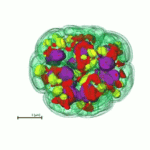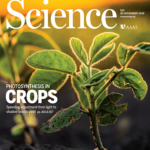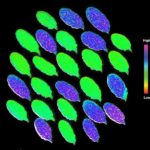Scientists have sequenced the genome of a green alga that has drawn commercial interest as a strong producer of quality lipids for biofuel production. The chromosome-assembly genome of Chromochloris zofingiensis provides a blueprint for new discoveries in sustainable biofuels, antioxidants, and other valuable bioproducts. The team was led by Kris Niyogi, faculty biologist in the Molecular Biophysics and Integrated Bioimaging Division and included researchers from UCLA and UCSF. The alga was imaged in the National Center for X-ray Tomography, located at the Advanced Light Source. Read the science short at the Berkeley Lab News Center.
Mother and Son Both Elected to National Academy of Sciences
Like mother, like son. In May 2016, Krishna “Kris” Niyogi, who grew up in Oak Ridge, was elected to the National Academy of Sciences (NAS). Eighteen years earlier, in 1998, his mother Audrey, who worked at Oak Ridge Lab for 44 years, was elected to the academy, which is a private, nonprofit organization of the country’s leading researchers.
The NAS recognizes and promotes outstanding science through election to membership; publication in its journal, PNAS; and its awards, programs, and special activities. Through the National Academies of Sciences, Engineering, and Medicine, the NAS provides objective, science-based advice on critical issues affecting the nation. Election to membership in the NAS is considered one of the highest honors that a scientist can receive.
Niyogi, a faculty scientist affiliated with the Molecular Biophysics & Integrated Bioimaging Division, and his mother were recently featured in a “Historically Speaking” post of the Oakridger which includes several quotes of Niyogi.
Bioscientists Named American Association for the Advancement of Science Fellows
Two members of the Biosciences Area, Eleanor A. Blakely and Krishna K. Niyogi, were among the five Lawrence Berkeley National Laboratory-affiliated researchers elected as Fellows of the American Association for the Advancement of Science (AAAS) this week. This honor is bestowed for distinguished and continuing achievements in advancing science to serve society.
Crop Yield Gets Big Boost with Modified Genes in Photosynthesis
Plant biologists have bumped up crop productivity by increasing the expression of genes that result in more efficient use of light in photosynthesis, a finding that could be used to help address the world’s future food needs. Scientists in the Molecular Biophysics & Integrated Bioimaging (MBIB) Division at Berkeley Lab, the University of California, Berkeley (UC Berkeley), and the University of Illinois targeted three genes involved in a process plants use to protect themselves from damage when they get more light than they can safely use. By increasing the expression of those genes, the scientists saw increases of 14-20 percent in the productivity of modified tobacco plants in field experiments. MBIB Faculty Scientist Kris Niyogi, who is a Howard Hughes Medical Institute investigator and a UC Berkeley professor of plant and microbial biology, teamed up with Stephen Long, a plant biology and crop sciences professor at Illinois, for the Science study. Read more at the Berkeley Lab News Center.
Let There Be (More) Light
Excess light energy that a plant can’t absorb needs to be dissipated to avoid damage and oxidative stress. Krishna Niyogi, a faculty scientist in Molecular Biophysics and Integrative Bioimaging and a UC Berkeley professor of plant and microbial biology, led the study that included researchers from Berkeley Lab, UC Berkeley, University of Pennsylvania School of Veterinary Medicine and Colorado State University at Fort Collins. The scientists are studying ways to increase the amount of light that can be safely absorbed, potentially leading to more efficient photosynthesis and higher crop productivity. Read the Berkeley Lab Science Short.
Was this page useful?








